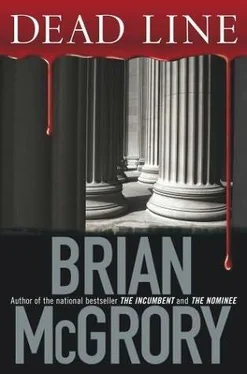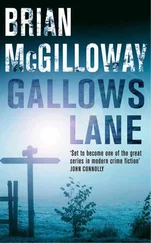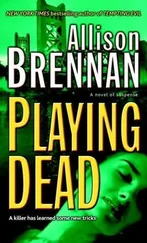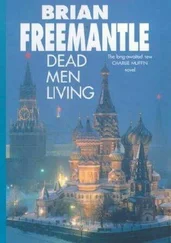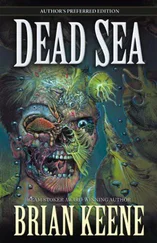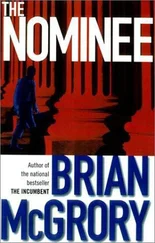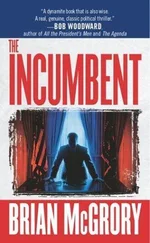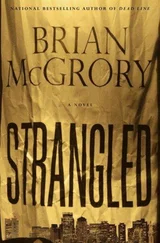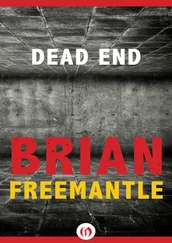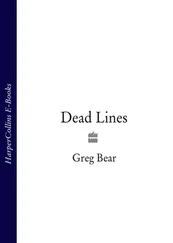Brian Mcgrory - Dead Line
Здесь есть возможность читать онлайн «Brian Mcgrory - Dead Line» весь текст электронной книги совершенно бесплатно (целиком полную версию без сокращений). В некоторых случаях можно слушать аудио, скачать через торрент в формате fb2 и присутствует краткое содержание. ISBN: , Жанр: Политический детектив, на английском языке. Описание произведения, (предисловие) а так же отзывы посетителей доступны на портале библиотеки ЛибКат.
- Название:Dead Line
- Автор:
- Жанр:
- Год:неизвестен
- ISBN:0-7434-8034-1
- Рейтинг книги:3 / 5. Голосов: 1
-
Избранное:Добавить в избранное
- Отзывы:
-
Ваша оценка:
- 60
- 1
- 2
- 3
- 4
- 5
Dead Line: краткое содержание, описание и аннотация
Предлагаем к чтению аннотацию, описание, краткое содержание или предисловие (зависит от того, что написал сам автор книги «Dead Line»). Если вы не нашли необходимую информацию о книге — напишите в комментариях, мы постараемся отыскать её.
Dead Line — читать онлайн бесплатно полную книгу (весь текст) целиком
Ниже представлен текст книги, разбитый по страницам. Система сохранения места последней прочитанной страницы, позволяет с удобством читать онлайн бесплатно книгу «Dead Line», без необходимости каждый раз заново искать на чём Вы остановились. Поставьте закладку, и сможете в любой момент перейти на страницу, на которой закончили чтение.
Интервал:
Закладка:
I said, “I would have thought Ortiz would have bunted. Lucky he didn’t.”
More silence. Apparently no one felt like talking baseball, even after such a monumental win. Perhaps only their little messenger had been at the game. Or perhaps these guys were unschooled in the conversational arts.
By now, the car had driven through Government Center and pulled into a hulking downtown parking garage. I’ll confess, I didn’t quite get it. We left one garage only to arrive at another. The car kept circling through the building, heading upward toward the roof, around and around, past all the empty spaces. Finally, we pulled into a short section marked by signs that said, Reserved, Government Vehicles Only. The driver, who wore a baseball cap, glasses and the previously noted dark windbreaker, threw the car into park and hit the unlock button. The man in the passenger seat jumped out and opened my door.
Now I didn’t exactly feel like a hostage, but nor did I feel free to come and go, either. As I was walking, I noticed that these Blues Brothers knockoffs essentially had me surrounded, their shoes clicking on the concrete floor as they guided me toward a steel door.
One of them, the driver, placed a security badge against the door, and there was an audible click. He pushed the door open into a well-lit hallway, and the four of us proceeded down a short, austere corridor amid our practiced silence.
At a second steel door, same routine. Inside, though, the hallways were carpeted, the lighting softer. We kept walking, took a left, then a quick right, and suddenly I found myself in an outsize office with a mustachioed man in a light blue windbreaker over a shirt and loosely knotted tie sitting behind an enormous wooden desk.
He stood up. The three men backed out behind me. The office door closed with a soft click.
“Good evening, Mr. Flynn,” the man said, his whiskers twitching as he spoke in a gentlemanly farmer kind of way. “Nice of you to come out here at this hour. I appreciate that very much.”
He came around the desk and shook my hand, all friendly and familiar, as if we knew each other, though I had never met him before.
I replied, just as breezily, “I’m not entirely sure I had a choice.”
He gave me a low laugh while meeting my gaze. “Oh, you did. You certainly did. And you’re free to go at this very moment if you’d like. I’ll even have my”—and he paused here for a sliver of a second—” associates drive you right to your house.” His mustache twitched again as he flashed a wry smile.
That’s obviously not what I wanted for a lot of reasons, not the least of which was that I was within walking distance of my home, but no need to point that out. And I had come this far, arrived at this unusual sanctum. I wanted to find out who this was and what he had for me.
When I didn’t respond, he said, “I’m Tom Jankle, special agent with the Federal Bureau of Investigation. I’m a fan of your work.”
I said, needlessly, “Jack Flynn, reporter for The Boston Record.” I didn’t mean to make fun of his introduction, though maybe I did.
Still in his windbreaker, as if he had just come in from raking leaves in the yard or, say, rounding up a collection of bank robbers, he beckoned me to a pair of upholstered chairs around a low-slung coffee table. Tom Jankle was, in a word, famous. I’ll throw out another one: celebrated. He was arguably the most effective agent in the entire beleaguered Bureau, a one-man crime-busting squad who took down the New England Mafia, the Irish Mafia, politicians, bank robbers, white-collar criminals who thought they were above the law — anyone and everyone. And he did it all with a strangely unassuming air about him, as if he were an engineer in a struggling high-tech company out on Route 128, not an agent with the most powerful law enforcement organization in the world.
And there I was, in my first face-to-face with him, wearing faded jeans and a lazy navy blue sweater over an old tee shirt. My breath was a combination of the Italian sausage, Cracker Jack, peanuts and multiple beers I had consumed during the game, not to mention the Cool Dog. And yet, he made me feel perfectly comfortable.
He said, “Were my boys good to you on the way over?”
I nodded and said, “Here I am, so they got the job done.”
He leaned back for a moment, taking me in, sizing me up, a look of mild amusement on his bespectacled face. Then he said, “Jack, if you don’t mind me calling you Jack, you and I don’t know each other, but right now, we can do each other a whole lot of good.”
And with that, he leaned forward, his elbows on his knees, and he told me a story. What he neglected to tell me was how much bad we could do each other as well.
Chapter Three
Tom Jankle reached into a manila envelope that had been sitting on the glass coffee table before him and pulled out a stapled sheaf of documents. He read them for a moment as I watched his eyes descend the page.
Finally, he looked up at me and said, “Whoa boy. This is one heck of a story.”
You don’t hear the word heck a lot these days, especially among street-wizened agents. But he looked like just the kind of person who might try to revive its usage.
He looked back down at the sheets for a moment, then again at me. “What do you know about the Gardner theft?” he asked.
He might as well have just pulled his gun from his holster and fired a round into the bare white walls of his office. He might as well have just kicked me in the gut, or opened up a percussion grenade on the drab gray carpet of this windowless room. The entire world stopped short for a flicker of a moment. My vision blurred, my thoughts derailed, all sound, all motion, all sensory perceptions, ceased to exist.
And then I replied, unsure how I even scraped the single word from the far corner of my brain and out of the depths of my throat, “Some.”
Forgive my drama, but the Isabella Stewart Gardner Museum remains the largest art heist in the history of America, a brazen robbery undertaken in the dark of a Sunday night thirteen years before by a pair of men dressed in Boston police uniforms who knocked on the massive front doors of the stately old museum and said there had been a disturbance nearby.
Once inside, the two imposters proceeded to bind and gag the two security guards, then methodically cut eleven art treasures from their frames on the walls, including works by Rembrandt, Vermeer, Manet and Degas. My tastes tend to run toward Five Dogs Playing Poker, but even I understood the import of this brazen act, and if I didn’t, then the estimated price tag on these so-called priceless treasures made it quite clear. Experts said they were worth something in the neighborhood of $300 million, which, as the gossip columnists who write the Traveler’s “Scene and Heard” column might say, is a very nice neighborhood indeed.
Most notable for the purposes of this conversation, the theft remained unsolved all these many years and so many thousands of infertile leads later. Nothing. Zero. Nada. Zip. When the two bandits were leaving the museum, one of them said to the bound guards, “Tell them they’ll be hearing from us.” But nobody ever had.
And now this. I had a very intense-looking lead agent with the Federal Bureau of Investigation sitting across from me in the urgency of a September night saying he wanted to talk about the Gardner Museum.
“But what should I know?” I asked.
He pulled his big frame up from his chair with a groan and ambled over to a tiny, beat-up old refrigerator that I hadn’t previously noticed on the other side of his desk. He walked like he had just stepped off a horse.
“Beer?” he called out.
“Sure,” I replied. I had already had enough for the night, and didn’t want Augustus Busch impairing my senses any further, but to say no would have put me and him at a different place at a time I needed us to be nothing less than simpatico.
Читать дальшеИнтервал:
Закладка:
Похожие книги на «Dead Line»
Представляем Вашему вниманию похожие книги на «Dead Line» списком для выбора. Мы отобрали схожую по названию и смыслу литературу в надежде предоставить читателям больше вариантов отыскать новые, интересные, ещё непрочитанные произведения.
Обсуждение, отзывы о книге «Dead Line» и просто собственные мнения читателей. Оставьте ваши комментарии, напишите, что Вы думаете о произведении, его смысле или главных героях. Укажите что конкретно понравилось, а что нет, и почему Вы так считаете.
